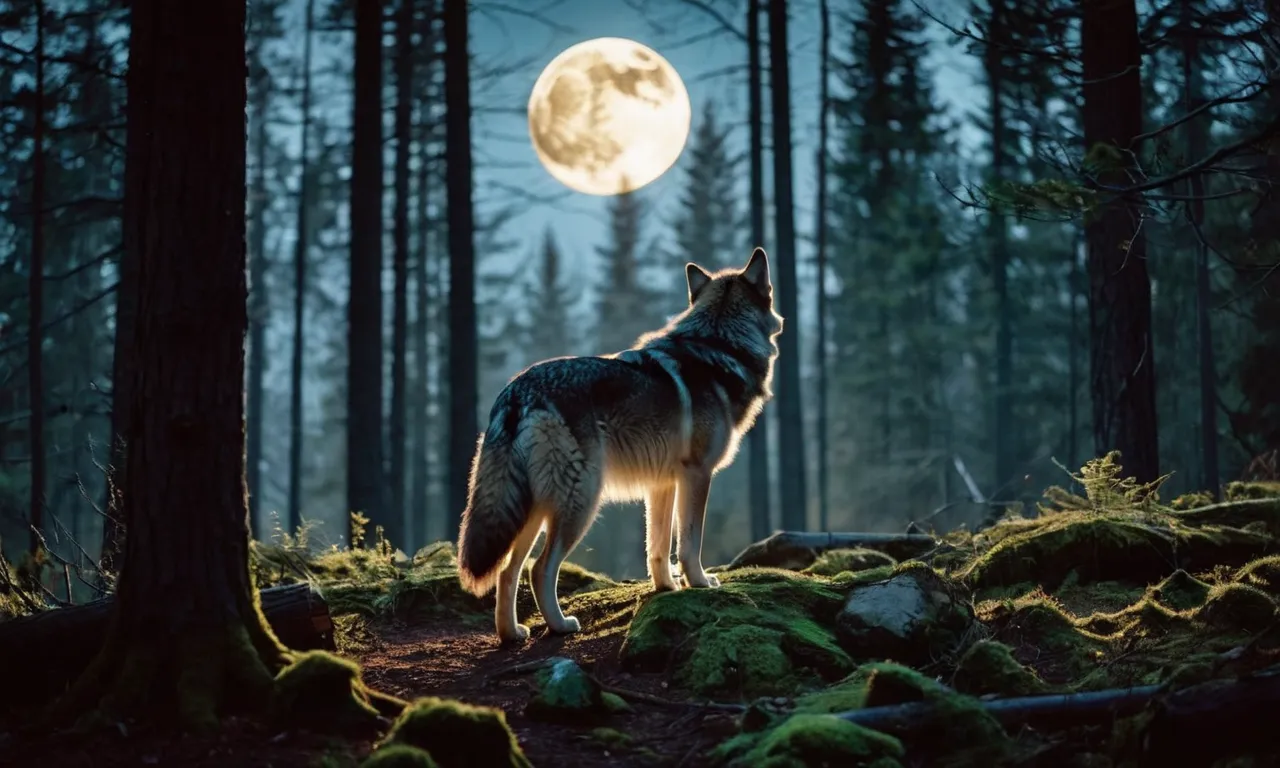Who Is The God Of Wolves?
Wolves have captivated the human imagination for millennia with their wildness, intelligence, and social complexity. It’s no wonder that wolves feature prominently in the mythologies and folklore traditions of many cultures around the world.
If you’re short on time, here’s a quick answer to your question: Many Indo-European mythologies feature wolf gods or gods closely associated with wolves, such as the Norse god Odin and the Greek god Apollo. But there is no single definitive ‘god of wolves’ found across world mythologies.
In this article, we’ll take a deeper look at some of the major wolf deities from belief systems around the world. We’ll explore Norse, Greek, Roman, Native American, and other myths to uncover the different wolf gods, their attributes, and their connections to wolves and humans.
Odin – Ruler of Wolves in Norse Mythology
Odin’s Attributes and Symbols
As the chief god in Norse mythology, Odin had many attributes and symbols associated with him. He was often depicted as a tall, old man with a long beard and only one eye. His missing eye was traded for a drink from the Well of Wisdom, showing his relentless pursuit of knowledge.
Odin’s key symbols included his magic spear Gungnir and his eight-legged horse Sleipnir, which enabled him to traverse between worlds with ease. As a shape-shifter, Odin was also closely linked to animal forms like the wolf and raven.
Overall, Odin was regarded as extremely wise and knowledgeable – a powerful yet enigmatic figure in Norse myths.
Odin’s Wolves Geri and Freki
Odin had two wolves named Geri and Freki that loyally accompanied him. Their names translate to “the ravenous” and “greedy one,” representing their fierce hunting nature as they tracked down prey. Rather than typical pet dogs, Geri and Freki symbolized Odin’s connection to wild wolves and his role as a hunting god.
The wolves sat by Odin’s side at feasts, where he would offer them choice meat and wine. They sometimes represented dual aspects of Odin’s nature – wisdom and primal fury.
According to one myth, Odin created the wolves himself. This highlights his mastery over crafting living creatures and his dominance in the animal kingdom. Overall, Geri and Freki demonstrate Odin’s close companionship with wolves as a Norse god strongly tied to wilderness and animals.
Odin as Wolf Shapeshifter
Odin was one of the foremost shapeshifters in Norse mythology, with an affinity for transforming into animal forms like the wolf. By channeling a wolf’s body, Odin could roam stealthily on the hunt while tapping into the wolf’s primal instincts and ferocity.
There are several tales of Odin appearing as or bonding with wolves to achieve certain ends.
In one story, Odin won the magical mead of poetry by shapeshifting into a wolf. He stealthily made it past guards and used wit and instinct to access the precious mead. This shows how Odin combined his godly powers with lupine cleverness to attain new wisdom.
His affinity for wolves and willingness to channel their attributes highlights why Odin may be considered a “Wolf God” in Norse mythology.
Apollo – Greek God Sometimes Depicted with Wolves
Apollo is one of the most important gods in Greek mythology. He is the son of Zeus and Leto, and the twin brother of Artemis. Apollo was associated with many aspects, including music, healing, prophecy, and the protection of the young.
Interestingly, he was also sometimes depicted with wolves or had connections to wolves in myth.
Apollo in Mythology
In Greek mythology, Apollo was born on the island of Delos along with his twin sister Artemis. His mother Leto was unable to give birth on land due to the jealousy of Hera, Zeus’s wife. Apollo later became the god of many domains, including music, poetry, knowledge, healing, plague, prophecy, and protection of the young.
He was usually depicted as a handsome young man carrying a lyre or bow and arrows. Apollo was known for his beauty and perfection.
Apollo’s Association with Wolves
Despite being primarily associated with more civilized realms like music and knowledge, Apollo interestingly had connections to wolves in some myths and legends. When Apollo was born, according to some legends his mother Leto was protected and assisted by wolves.
In some artistic depictions of Apollo’s birth on Delos, wolves are shown keeping watch over the newborn twins Apollo and Artemis.
Wolves were also associated with one of Apollo’s important epithets – Apollo Lyceus. This name connects Apollo to Lycia, the land of wolves. Additionally, Apollo was sometimes referred to as Apollo Lycaeus, further strengthening the association between the god and wolves.
Wolves as Symbols in Apollo Worship
Because of the mythic connection between Apollo and wolves, wolves became symbols of Apollo in ancient Greek religion. One of Apollo’s sacred sites was at Mount Lycaeum, also known as Wolf Mountain. Here Apollo was worshipped as Apollo Lycaeus and the wolf was considered a sacred animal.
The altar of Zeus at Mount Lycaeum featured a bronze statue of a wolf as an emblem of Apollo.
Scholars believe that the wolf connection relates to Apollo’s role as a protecting god. Wolves were seen as destructive but also messengers of the gods who kept people safe. Since Apollo protected flocks and herds, the wolf symbol likely originated from this protective capacity.
Overall, the presence of wolves in Apollo’s myths and cult reflects his attributes as a guardian deity.
Other Wolf Gods and Mythic Figures
Lupa Capitolina and Romulus in Roman Myth
In Roman mythology, Lupa Capitolina was a she-wolf who nursed and raised the legendary founders of Rome – Romulus and Remus. The iconic image of the she-wolf suckling the twin brothers has come to symbolize the founding myth of Rome.
According to the legend, Romulus and Remus were abandoned as infants and left to die. But they were rescued by the she-wolf who took pity on them and nursed them back to health. Eventually, the twins went on to establish the city of Rome.
Lupa Capitolina represents the wild and nurturing spirit of the she-wolf, while Romulus and Remus represent the adventurous and ambitious spirit of the Roman people. Together, they encapsulate the primordial energies that birthed one of the greatest civilizations in human history.
The she-wolf remains an enduring symbol of ancient Rome to this day.
Native American Wolf Gods and Spirits
Wolves feature prominently in the mythology and folklore of many Native American tribes. They are often portrayed as wise teachers, loyal companions, and guardians of the natural world.
Some major Native American wolf deities and spirits include:
- Amarok: The mighty wolf god of the Inuit people of the Arctic. Amarok was said to hunt alone and kill prey larger than himself.
- Iyatiku: The Navajo goddess of childbirth and motherhood, who takes the form of a wolf to teach lessons about family and caring for children.
- Ma’iingan: The Anishinaabe tribe have myths about Wolf Spirits known as Ma’iingan, believed to guide and teach human tribes in the ways of wisdom.
In Native American culture, wolves symbolize teacher archetypes who embody loyalty, intelligence and spiritual guidance. Tribes even honored wolves during special rituals for their protective spirits.
Wolves in Eastern Mythology
In Hindu mythology, wolves are ridden by the ferocious man-god Bhairava, and the wolf banner is carried by the god Shiva’s wandered soldiers. There are also references to the demonic side of wolves in some Hindu folklore.
In Japanese mythology, the okuri-inu is a mysterious spirit wolf that follows lone travelers at night, acting both as an ominous portent of danger and as a steadfast guide. There are tales of the okuri-inu either saving travelers from falling off cliffs or luring them deeper into treacherous terrain if they don’t heed its warnings.
In Chinese astrology and legends, wolves represent guardianship, loyalty, and reliability. Chinese traditions also highlighted the wolf’s importance in balancing the natural world as well as the need to both respect and tame its wild nature through spiritual mastery and self-cultivation.
Across Eastern mythology, the wolf takes on many shapes – both as an auspicious and ominous archetype representing the unknown forests and forces beyond the boundaries of human control and understanding.
Conclusion
As we have seen, wolves hold an important place in the mythologies of many ancient cultures across the world. While no single definitive ‘god of wolves’ emerges from the myths, many gods and legendary figures have strong symbolic or literal connections to wolves.
The prominence of wolves in these stories underscores the deep impress that these mysterious, powerful carnivores made on the human consciousness. The complex relationship between man and wolf continues to this day, but tracing its roots in ancient myths allows us to better understand where that relationship began.








